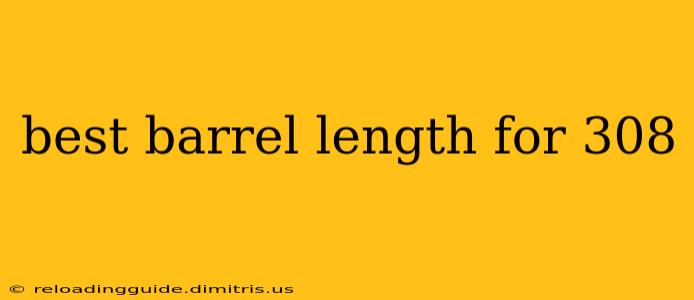Choosing the right barrel length for your .308 Winchester rifle is a crucial decision impacting accuracy, velocity, and overall performance. There's no single "best" length, as the ideal choice depends heavily on your intended use – hunting, long-range target shooting, home defense, or something else entirely. This guide will explore the advantages and disadvantages of various barrel lengths to help you make an informed decision.
Understanding the Impact of Barrel Length
Barrel length directly affects several key aspects of your .308's performance:
Velocity:
Longer barrels generally yield higher muzzle velocities. This is because the propellant has more time to burn before the bullet exits, transferring more energy to the projectile. However, this increase diminishes with barrel length, and the gains become less significant beyond a certain point (often around 24 inches for .308).
Accuracy:
While longer barrels can contribute to improved accuracy due to higher velocity and better bullet stabilization, it's not a guaranteed correlation. Accuracy is influenced by many factors, including barrel quality, ammunition consistency, and the shooter's skill. A shorter barrel, if well-made, can still deliver excellent accuracy, especially at shorter ranges.
Weight and Handling:
Shorter barrels significantly reduce the overall weight and length of the rifle. This improves maneuverability, making it easier to handle in tighter spaces or during extended hunts. A lighter rifle also reduces fatigue, particularly during long shooting sessions.
Recoil:
Barrel length has a less direct impact on recoil than other factors like cartridge weight and action type. However, shorter barrels can potentially exhibit slightly higher felt recoil due to less time for the expanding gases to decelerate.
Barrel Length Options and Their Applications
Let's break down the common barrel lengths for .308 and their ideal uses:
16-Inch Barrels:
- Pros: Lightweight, compact, maneuverable, ideal for hunting in dense cover or close-quarters situations.
- Cons: Lower muzzle velocity compared to longer barrels, potentially reduced accuracy at longer ranges. Best suited for shorter-range applications.
18-Inch Barrels:
- Pros: Good balance between weight, velocity, and accuracy. A popular choice for many hunters and shooters. Offers a compromise between performance and maneuverability.
- Cons: Still might not deliver optimal velocity for extreme long-range shooting.
20-Inch Barrels:
- Pros: Often considered a sweet spot, providing a substantial boost in velocity compared to shorter barrels without excessive weight. A versatile option for various uses, including hunting and moderate long-range shooting.
- Cons: Heavier than shorter barrels, might be less desirable for those prioritizing maneuverability.
24-Inch Barrels:
- Pros: Maximum velocity and potentially improved accuracy at longer ranges. The preferred choice for long-range precision shooting competitions.
- Cons: Significantly heavier and less maneuverable than shorter barrels, which can make them less practical for hunting or other applications requiring quick target acquisition.
Conclusion: Choosing the Right Barrel Length
The best barrel length for your .308 depends entirely on your priorities and intended use. Consider the following factors when making your decision:
- Intended Use: Hunting, target shooting, home defense, etc.
- Shooting Distance: Short-range, medium-range, or long-range.
- Desired Balance of Weight and Velocity: Do you prioritize maneuverability, or is maximum velocity more important?
Carefully weigh these factors to choose the barrel length that best suits your needs. Consulting with experienced shooters or professionals at a gun store can provide valuable insights and help you make an informed decision. Remember, proper sighting and ammunition selection are crucial regardless of barrel length.

